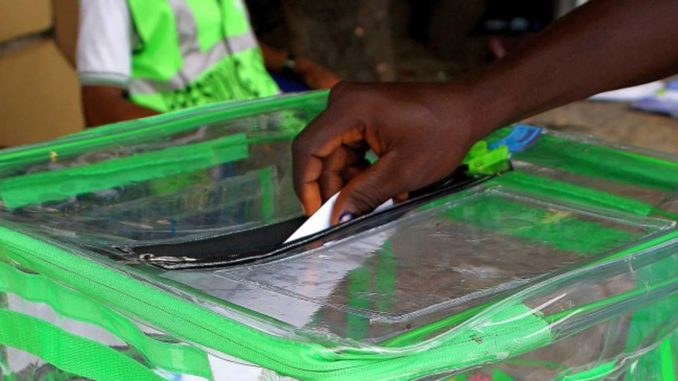
POLITICS is still played at a very crude level, with the actors going to any length to get into public office. The avalanche of post-primary election court cases – about 639 for now – which the Independent National Electoral Commission is contending with in the run-up to the 2019 general election is a pointer to this. With the elections scheduled to begin soon, this rash of cases is set to reverberate beyond the polls.
The magnitude of the task before the electoral umpire can be gauged by the fact that INEC had received 584 requests for certified original copies of documents from aggrieved contestants who want to pursue their cases in court. In dispute are party primaries for state assembly, National Assembly and governorship positions. The most contentious cases involve gladiators in Rivers, Zamfara, Ogun and Enugu states.
In obedience to its extant rules on the time frame to conduct primaries and court rulings, INEC had excluded the All Progressives Congress governorship and House of Assembly candidates from its final list of candidates for the March 2 polls in Rivers and Zamfara states. INEC is justified as it is playing by the laid down rules, which political parties should adhere to.
In Rivers, the party had held factional primaries, with one answerable to a minister and the other to a sitting senator. Rightly, INEC excluded the APC candidates from the final list. Adamantly, the two factions went to war as they jostled for INEC’s recognition. At the end of the day, the two factions ended up in court. This is a veritable setback and an administrative nightmare for INEC, which the Court of Appeal compounded on February 4 by ordering INEC to stay execution of an earlier judgement that barred it from putting APC candidates on its list.
Simultaneously, INEC is facing a delicate moment in Zamfara, where it excluded the party’s governorship and state assembly candidates from the ballot. The charge against the party is that it did not conduct its primaries in accordance with the time set by the umpire. In Ogun State, the Peoples Democratic Party is suffering similarly fractious post-primaries. There, two factions are battling it out for INEC recognition. After a seemingly interminable legal row, a court has certified Kashamu Buruji, a factional head, as the party’s governorship candidate.
It seems the APC is finding it difficult to put its house in order. After rowing for several months, a Federal High Court in Abuja, on Tuesday, sacked Ayogu Eze as the APC governorship candidate for Enugu State. It ordered INEC, which published its final list last week, to recognise George Ogara as the authentic APC candidate.
With contestants not ready to sheathe their swords, the Social Democratic Party is equally involved in this macabre drama. Two contestants – Donald Duke and Jerry Gana – are squabbling over who should be the party’s candidate in the February 16 presidential election. Initially, INEC had listed Duke, but was forced to reverse itself when a court ruled that the SDP did not follow its own rules on zoning. So, INEC recognised Gana. Owing to some legal gyrations, INEC left the space for the name of the party’s presidential candidate blank, until the Court of Appeal reinstated Duke.
This is a big issue: it is a loophole for post-election litigation. Also, it has a sense of déjà vu. On the eve of the 2007 presidential election, the Supreme Court ordered INEC to list the Action Congress of Nigeria candidate, Atiku Abubakar, on the ballot. INEC was forced to scamper around to save the situation. It entailed waste when ballot papers had to be reprinted at a huge cost, and at a short notice, in obedience to the court order. Unfortunately, with Nigeria’s judiciary notoriously slow, INEC might witness these legal encumbrances this time again.
What remedies are available to escape the logjam? INEC has admirably stuck to its rules and obeyed court orders in these avoidable debacles. Yet, when it comes to Nigeria’s political class, there are no easy solutions. The litigation envelopes the umpire in uncertainty, but it should continue to stick to principles, refuse to bend the rules, and eventually force the unprincipled politicians to play by the rules.
This leaves us with the judiciary. For pre-election litigation, the judiciary should speedily deliver judgements. This will save INEC’s blushes and allow it to plug all the lacunae in its preparations well before Election Day. Equally, it will instil credibility into the electoral process. Waiting until a few days to Election Day to deliver judgement is, therefore, an irritant that must end.
In all this, time is of the essence, especially for INEC. Judges can hold hearings on a daily basis, including Saturdays and Sundays. Therefore, the judiciary should read the national mood, dispense with post-primaries litigation swiftly and stop putting INEC in a tight corner.
In the past, election litigation – except for the presidential ballot – ended at the Court of Appeal. Already, the Supreme Court’s diary is filled with cases up until 2021, as stated by Walter Onnoghen in October 2018. To avoid these lengthy delays, we should return to that previous policy, which freed the Supreme Court of needless cases. In addition, the election cases for the state assembly could end at the High Court.
END

Be the first to comment